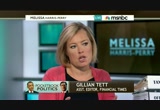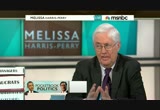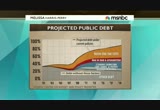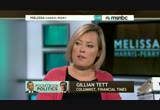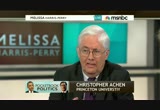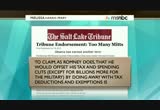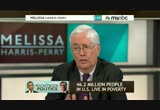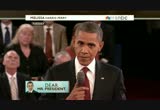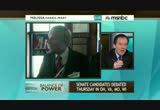tv Melissa Harris- Perry MSNBC October 20, 2012 7:00am-9:00am PDT
7:00 am
good morning. i'm melissa harris-perry. everybody i know loves a good bargain. whether it's tough economic times or prosperous ones, a bargain is a bargain. so this week's presidential debate has me wondering when we are making our choice for president, are we bargain hunting? are we looking for a deal, somebody who will give us everything we want but cost us nothing? well, you know what they say, buyer beware. a bargain is not always a good deal, which brings me to the beloved children's story a bargain for frances. frances is a little girl who decides to have a tea party with her friend, thelma. now, frances' mother reminds her to be careful because every time she plays with thelma, frances seems to get the short end of the stick. frances knows her mother's warning, but she goes off to her tea party anyway. frances tells thelma that she is saving up for a tea set, a real china set with pictures on it in
7:01 am
blue. thelma says that her tea set is actually better because it has red flowers, and since it's plastic, it won't break easily. but frances is clear. she wants a real one. thelma insists that her plastic tea set is better and asks frances how much money have you saved up? frances tells her $2.17. so thelma goes in for the kill. maybe she'll sell frances her set and, oh, by the way, they don't even make the one that you want anymore. frances is convinced. she goes home. she gets her money. she brings her money back, and thelma sells her the tea set, and then she says no backsies. frances walks home with her dolls and her new plastic tea set. that is in her younger sister flora tells her the tea set is ugly and that the local candy store does, in fact, sell the china tea set that frances wanted for $2.07.
7:02 am
frances walks to the store. what do you think she sees? that's right. that wreched thelma using her money to buy the china tea set that she wanted, but frances won't go down without a fight. she goes home and places one penny in the plastic sugar bowl. then she calls up thelma who immediately he tells her no backsies, but frances says, okay, then i'm going to keep what's in the sugar bowl. thelma asks her what is it? what's in the sugar bowl? frances says, never mind, no backsies and hangs up. sure enough, thelma calls back not remembering what's in the tea set. thelma guess a few things, but frances tells her no backsies, so she doesn't have to tell her in the sugar bowl. frances offers a new deal. give her back the money and thelma can have back the plastic tea set. thelma is caught. she admits that she can't give back the money because she bought the new tea set, the one that frances wanted all along. they strike a new bargain.
7:03 am
thelma gives frances the china tea set, and even the extra dime. you can imagine when thelma opens the sugar bowl and realizes there's only a penny, she tells frances that she is tricked, and now she's going to have to be careful around her. at which point frances reminds thelma of the trick that was played on her in the first place and says it's not so much fun to be careful. it would be better to be friends. all right. it was a little indulgent to tell you that story, but here's the deal, the point is that you, dear voter, are frances. she's basically an ordinary american. she knows she wants the real thing. real opportunity, real recovery, real fairness, real security, the real china set with blue flowers, but when she's looking for a short-term bargain, sometimes this voter will get the short end of the stick, and the bill of goods that the gop and mitt romney are trying to sell you is basically not the real thing. it's a plastic tea set with red
7:04 am
flowers. according to the center on budget and policy priorities, the bush tax cuts and the wars in iraq and afghanistan will account for almost half of the $18 trillion in debt under current policies. the nation will owe by 2019. the stimulus measures and the financial rescue will account for less than 10% of the debt at that time. what about the tax plan and the budget bargains that mitt romney is trying to bargain you for? well, an analysis shows that if the tax base isn't broadened, romney's plan would cut taxes by $481 billion by 2015, which would mean a $4.9 trillion revenue loss over the next decade. how do you think he will make up for that loss? in capping federal spending at 20% of gdp will require massive cuts in entitlement and discretionary programs. that means the safety net of the
7:05 am
47% would be in great danger under a romney administration. folks, frances' story is your story. don't just take my word for it. if in the endorsement of the presidential race from the salt lake tribune, a paper you would think would be a gimme for governor romney. it secures the republican standard bearer for his seemingly neverending shape shifting by writing this. from his embrace of the party's radical right wing to subsequent portrayals-himself as a modern champion of the middle class, romney has raised the most frequently asked question of the campaign, who is this guy really? what in the world does he truly believe? the editorial board concludes with this. "our endorsement must go to the incumbent, a competent leader who, against tough odds, has guided the country through catastrophe and set a course that while rocky, is pointing toward a brighter day. the president has earned a second term. romney, in whatever guys, does not deserve a first."
7:06 am
indeed, instead of being talked into making a sketchy deal based on deception so that the top 1% can buy their new china tea set, we need to be patient as our economy comes back from the brink and not be talked into a bad trade. joining me now, jillian tete columnist for the financial times and christopher aiken, a professor of politics at princeton university. it is so nice to have you both here. >> thank you. >> all right. yes, i did start with my favorite children's book, but it's, in part, because as i was reading it, i kept sort of thinking to myself as i was listening to them in this debate that we were in a bargain for frances' moment, we were being told something that just wasn't accurate. >> the other met for i would use apart from the children's book, is about going on a die sxet trying to lose weight. i mean, you get sold these quick-fix solutions that tell you just pop a pill, and you will lose weight and you'll be happy. the reality is anyone knows it takes a lot of discipline, it takes a lot of time, and it
7:07 am
takes a combination of measures. that's very important. you have to watch your weight -- have to watch your food, and have you to exercise, and you have to be organized. it's like fixing the great big problem of america's debt. unfortunately, there is no magic wand. no matter whether it's a republican campaign or a democratic campaign, anyone who says right now that we have an easy solution for these problems, frankly, is lying to the voters. >> right, because this is profoundly complicated, right, chris? in our study of american politics we know that there's this sort of truism, right? when the economy is good, the incumbent is likely to win. when the economy is bad, the incumbent is likely to lose. but what do we neen when we say the economy is good? do we mean sort of beginning to show recovery? do we mean absolutely measures? do we mean how people feel and per sea it? what is that good and bad that we're talking about in that? >> this is not an easy question, melissa. >> yeah. >> we have -- the data that we've used to look at this over the last couple of decades have
7:08 am
been in very different times from the times we're in now, and so the question is going to be is the situation which the incumbent president inherits a disastrous economic situation, are the voters going to give him a little bit of credit for that, or are they going to do what we think they usually do, which is look back one year and ask themselves whether times are good, and that is not certain at this point. >> yeah. this inherited issue is really interesting, right? we were looking at our favorite wonk, and the sort of visual image here is very clear. the president did, in fact, inherit the financial crisis that we're looking at. mitt romney did have that great line about, you know, oh, just blame it on the last guy, but if you look at that projected public debt, the vast majority of what that debt is are those bush era tax cuts. it is the wars, and if you look at that kind of gray area underneath, that's what the debt would be if we weren't still
7:09 am
managing those other crisises. what does that mean for the president come november? >> it means he has a very difficult position right now, because, you know, he is essentially trying to find a way to deal with the problems, which for the large part he inherited, didn't just create, and trying to get any buy-in for a sensible multi-pronged policy approach is extremely difficult in the current political polarization. one thing i want to talk about about how people perceive the economy. up until now everyone has presumed that economies were forged on the basis of gdp and broet and if the economy is growing, then people felt good and support the incumbent. if it's not growing, then they're upset. something has changed in this election, and it has been forged as much on what people are going to simply gain if the economy is growing, but what they might lose, and the question of entitlement programs is critical. i suspect that at the end of the day when people make that decision on november the 6th it's not just going to be about whether the employment rate is 7.8%, 8.1%.
7:10 am
will the economy grow? it's also going to be what are they going to take away from me in the future in terms of my entitlements? >> i think there's such a good point, and a kind of nuanced one. it's not just will i be doing better next year than i am this year or that question, ask yourself are you better off now than you were four years ago, but will i -- you know, the whole time what i wanted was the real thing. are you willing to be patient enough to wait and safe up for the real thing or do you take the deal of saying, okay, maybe there's more money in my pocket tomorrow, but then when i retire, there's no medicare there for me, there is no social security waiting for me. how should we expect americans to discount something like that? we just -- based on what we know about how americans think about voting, can -- will they be thinking about the fear of loss more or the possibility of a short-term gain more? >> in the current climate, i think fear of loss is going to be a big issue. the other thing i would like to point out, though, is that a
7:11 am
year that's a lot like this one is 1936, and the unemployment rate was not good in 1936, but things have perked up, and roosevelt had done a lot of things to try to protect people's livelihood in extremely difficult times. one thing that i have been amused by is that republican commentators are fond of saying this year that month one has ever been re-elected in the last 50 or 60 years with an unemployment rate like this. they carefully don't say 80 years because if they did, then they would be reminding all of us that roosevelt carried 46 out of the then 48 states in 1936. >> how do we end up in 1936 in our first segment. we have much more on this, and we are going to add some more folks to the panel. we'll get rid of the binders. i couldn't help myself. contraception coverage is not just a health issue.
7:12 am
it's an economic issue. we'll talk about that economic. let's see if there's anything in the sugar bowl too. oh, there is. no, no, no, stop! humans -- one day, we're coming up with the theory of relativity, the next... stop, stop, stop! my car! not so much. but that's okay. you're covered with great ideas like optional better car replacement from liberty mutual insurance. total your car, and we give you the money to buy one a model year newer. learn about it at libertymutual.com. liberty mutual insurance. responsibility -- what's your policy?
7:13 am
4'4g4'4g4'4g4'4g4'4g4'4g4'4g4'4 well, if itmr. margin?margin. don't be modest, bob. you found a better way to pack a bowling ball. that was ups. and who called ups? you did, bob. i just asked a question. it takes a long time to pack a bowling ball. the last guy pitched more ball packers. but you... you consulted ups. you found a better way. that's logistics. that's margin. find out what else ups knows. i'll do that. you're on a roll. that's funny. i wasn't being funny, bob. i know.
7:14 am
7:15 am
when governor romney says we should eliminate funding for planned parenthood, there are millions of women all across the country who rely on planned parenthood for not just contraception care, but for mammograms, cervical cancer screenings. that's a pocketbook issue for women and families all across the country. as the president was saying at tuesday night's debate, women's reproductive rights sht just about the polarized debate that is inspiring the proverbial war on women. no. having access to contraception is an economic issue that makes a difference for not only women, but ultimately their families.
7:16 am
now, the binders have been moved at the table, and in their place wefr jillian of the financial times, republican strategist rick tyler, who is now an advisor to missouri congressman todd akin, melanie ruselle is the national press secretary for the democratic national committee, and christopher achen, professor of politics at princeton university. i want to come to you on this, because i felt like the president made exactly the connection that had needed to be made for weeks, which is, yes, on the one hand, there's this issue about reproductive rights, but those reproductive rights issues are pocketbook issues for women. >> absolutely. this week -- just this week the cdc came out with a study that backs that up. if found that contraception use is very closely tied to income. only 19% of women who are at 150% of the poverty rate are using contraception. that's why we need the
7:17 am
affordable care act's protection and coverage of contraception for all women who are insured. many women which simply when forced to choose between contraception and food or contraception and child care -- >> sure. >> -- have made the choice to go with their child care or their food. it is absolutely a pocketbook issue, and we've known this for years, and this study certainly backs it up. >> if we just look at international indicators. i mean, in places where women have control over their reproductive capacity, they have higher educational gains and a higher income, they have smaller families. i mean, in every critical way, being able to space pregnancies and make determinations about when you have kids has an enormous impact on women's equality and their economic lives, which feels to me like why this debate around so-called war on women needs to be talked about in part in an economic way because we do have differing ethical or moral positions on this, but in the end if we're
7:18 am
going to improve the economy, which is, you know, what governor romney is telling us is the number one issue, the reproductive rights become part of this story. >> remember, george steph naul naup lis asked this question during the debate, and romney answered this question because we had no idea where this is going, and now we do. i think this issue in a large way -- and i don't want to diminish or demean it, but in a large way it's a distraction from romney's record -- or from obama's record. the fact is contraception is available. nobody denies it unless we are going to name some people, are against making contraception illegal. the question -- >> rick santorum. we can name one. >> the question -- i don't think rick santorum said he would make contraception illegal. what has been said is can we make the catholic church -- this is amendment one first sense, okay, in the bill of rights. is the question should we make religious institutions namely the catholic church, but there are others, pay for women's contraception when it goes against their religious liberty? >> we know they're not paying. this is a distortion, right?
7:19 am
no one is asking them to go to the store and purchase condoms or -- >> they want to make it part of their insurance program. >> that's -- >> and the president wants to mandate that. >> it provides for religious institutions. >> it does for now, but, look, it says -- >> it does for now because the president made it a priority. >> but this is a problem. throughout history the first institution always to go when the people -- when the government wants to impose its will on the people that you will all have to believe x and it has to be the church, right, because -- >> oh, okay. it's easy for you to say that. >> it's true historically. it's not my opinion. that's a historical fact. >> well, okay. let's pause. >> all right. i'll back -- let me back up. >> i think we want to be really careful about the idea that it's a historical fact that we throw out religion first, right? in fact, part of what we've managed to do in this country is develop a pretty robust capacity to have a secular government that can operate despite the
7:20 am
fact that people have very deep religious beliefs. we're much more religious, for example, than -- >> absolutely. >> i want to be really careful because i want to stay on this bargain, right? had if you are telling me that the bargain i have to cut for economic growth is that i have to give up reproductive rights and access to contraception -- >> you have -- >> that's a powerful historic fact. >> you have a presidential candidate who has said that he would support putting justices on the supreme court who would overturn roe v. wade. that says to me even if i were to buy the romney economic story, that i have to make a decision between am i supporting someone who is going to have the legacy of overturning roe v. wade and the federal bench did. >> overturning roe v. wade wouldn't make abortion instantaneously illegal. it would return it to a state issue and being a state -- >> well, i live in louisiana, and i know when it comes down to the states, there's plenty of states that are happy to make it illegal. >> except for yours. >> i think to a certain degree,
7:21 am
there's confusion right now about what governor romney would or would not do at that point. despite the polarization on the republican party, but on one hand he appears to be supporting hard lines in terms of supreme court picks. on the other hand, he has been trying to say that, actually, he is pro-choice and do what you want to do. >> that's just his romnesia. that is the condition he has that affordable care act luckily protects because it protects preexisting conditions. the condition he has that makes him forget the previous positions he has taken. >> romnesia was the president getting his swearing back, and he got his funny joking. i do want to see that the salt lake tribune which i quoted earlier in the show in their conversation about romney they say, look, the problem is we don't know which romney is going to show up, right? you don't know whether this is moderate romney or whether this is romney that saves the olympics or whether this is anti-roe v. wade romney. before we come back, i want to say that it says that to claim as romney does that he would
7:22 am
offset his tax and spending cuts except for billions more for the military by doing away with tax deductions and exemptions is inaccurate. it's not melissa, but, yes, right? that, in fact, the tax plan that mr. romney has given us has a similar kind of romnesia in it. when we come back, i want to talk more about exactly this issue with the tax plan and the continuing issue of what counts as an economic issue for the american people. new prilosec otc wildberry is the same frequent heartburn treatment as prilosec otc. now with a fancy coating that gives you a burst of wildberry flavor. now why make a flavored heartburn pill? because this is america. and we don't just make things you want, we make things you didn't even know you wanted. like a spoon fork. spray cheese. and jeans made out of sweatpants. so grab yourself some new prilosec otc wildberry. [ male announcer ] one pill each morning. 24 hours. zero heartburn. satisfaction guaranteed or your money back.
7:25 am
think. drink coffee. design something totally original. do it again. that's good. call in the engineers. call in the car guys. call in the nerds. build a prototype. mold it. shape it. love it. give it a starting price under 16 grand. uh-oh. the finance guys. you can't do that. [ male announcer ] kick out the finance guys. take it to the track. tweak. tweak. tweak. stop. take it to the car shows. call the critics. win some awards. making a groundbreaking car -- it's that easy. ♪ >> i care about 100% of the american people. i want 100% of the american people to have a bright and prosperous future. care about our kids. i manned what it takes to make a bright and prosperous future many america been. i spent my life in the private sector, not in government. i'm a guy that wants to help with the experience i have the american people. >> mitt romney says he cares about 100% of the american people and that he wants them to
7:26 am
be prosperous. even though he says that 47% of them depend on government and believe they are victims. if i'm going take governor romney at his word and believe that he wants to do good for 100% of the people, what are the policies, what are the indicators necessary to take people in a socially mobile way up the economic ladder? >> the post-war compact in america has very much been that there is socialability and incomability between the generations, and really in the last decade something very interesting has happened, which is the level of mobility between generations has started to not just decline, but many some measures actually fall behind some european measures, and that was your question, what is going to happen to the generation and what degree are you going put a fine measure to the undercurrent of anger that's developing amongst many americans, and that has a lot to do with the taxation system and to do with the education system, to deal
7:27 am
with the opportunities, and these are issues that people are touching on in the presidential debate. not square on. >> if we go back to the 1936 argument, right, it's one thing to face poverty in this moment, but it's another thing if you think that your children will also be unable to escape it. do we end up with a different kind of voting behavior? do we end up with middle class people voting differently from wealthy and working class people if they think these are permanent conditions for their lives? >> this is an excellent question, and i don't think we're sure yet how this is going to play out. what we do know is that contrary to what a lot of people imagine, it's the upper middle class and prosperous. when you are towards the bottom, you vote on economics. >> pocketbook. straight up. >> straight up. >> yeah. >> so the struggles of that group of people as gellian was just saying over the last ten or
7:28 am
20 years, their incomes in real terms are almost flat. the absolutely solution so that is not something you can wave your hand on and fix the first day you're in office. it's a longer term thing. better education. better training. all those things. that's going to have to be done primarily with government programs, not by letting the private sector do something about it. >> this is really the key. when we look at the fdr moment and look at what has brought us out of recession before, i hear governor romney saying i'm from the private sector, and, therefore, i know how to fix it, and every time i hear it, i think to myself if that's true, then why not just stay in the private sector and fix it? why come over to government? you must believe the government has a role. >> because the government has made it too difficult for the private sector to hire people. f.d.r. came out of the great depression we know now because of world war ii, not because of his economic policies. i think f.d.r. was probably one of the greatest politicians of the 21st century, but set that aside. >> george w. bush's wars drove us into this recession.
7:29 am
that's where that debt and deficit comes from. >> well, look, you have to -- look, one of the things that the government is supposed to do well is supposed to defend the country and defend freedom. we do that well. we historically. we have crowned no princes or taken no territories, and, yet, we've done this. look, as my friend and former congressman bob mckuhn likeses to we're 4% of the world's population. we create one-third of the world's wealth. we have more innovations and more inventions, more entrepreneurs and more nobel prizes of all types than all the other nations combined. there's a reason for that, and -- >> massive influx of public education provided by the government for free to every american citizen. >> i'll agree with you. let's say publication is good. show me the classes -- show me the classes both in the preliminary education post-secondary education that are teaching entrepreneurism and teaching success, teaching people how to -- because the way the economy works is i have to create a service or a product that rich people and others want, and, in other words -- >> well, actually, you're better off if you create a product that
7:30 am
ordinary folks want and will -- >> that's fine too. that's the way the market works. >> this is our wal-mart conversation. >> i bless you with my dollars because i want what you have more than the dollars in your pocket. that's how wealth is created. government can't create wealth. all they can do is take money from one set of people and give it to another. nothing is created. nothing is sold. it doesn't work. >> that's what we're talking about. >> government can create the economic policies and conditions for people to succeed. >> you cannot say that the g.i. bill did not force opportunity and -- to an entire generation. >> because it gave people an opportunity to get an education. i'm not against education, but -- >> that was a government program and one of the most successful government programs in history. >> right. >> i'm not anti-government. >> why the president if he had such -- one factor actually was the education was available for a wide swath of people through things like the g.i. bill. the question affects today's, how do you create that similar
7:31 am
kind of program without something like -- >> the fact is i would go further and say it gave us the human capital investment that the housing rights provided opportunities to invest in individual wealth creation through real estate ownership and then that the interstate transportation act created the infrastructure necessary to make it possible, and then all of those -- those great programs -- >> there was also a time when women came into the work force, but that wasn't a government program. that was a result of the condition. >> but these were all related, i think, fundamentally to government spending. over and over again i think if there's any extent to which this did not work, it is only because it was not large enough. jillian, thank you so much for being here. i hope you'll come back and hang out again. the rest are back for more, and up next my letter to the president of the united states. think about that performance on tuesday night. ♪ i'd like to thank eating right, whole grain, multigrain cheerios! mom, are those my jeans?
7:32 am
7:35 am
zi watch two things in my own living room, and i did take a moment to stand on my couch and give our nation's leader a well deserved round of applause for a job well done at the second presidential debate. but i thought i would go a step further and put pen to paper for our commander in chief. dear president obama, it's me, melissa. i just wrote to say thanks. thank you for bringing your a game on tuesday energized, caffeinated, prepped with data points and comeback arguments. thank you for reviving the base and showing the country that you can carry the burdens of the presidency and still have room for a little swagger. you made clear arguments for why you should be re-elected. you cogently packaged the argument against your opponent. good night of politics for you. but, but, but just a couple of things. remember when you said this? >> we've opened up public lands. we're actually drilling more on public lands than in the previous administration, and the previous president was an oil
7:36 am
man. >> okay. i get that running away from a strong national energy policy is hard in this recession era election, but touting an aggressive oil drilling directive as an achievement with no mention of the real life and death livelihood of the drill baby drill mentality is a little troubling. now, i know many americans have already forgotten the de stating effects that b.p. ae adrilling in the sensitive echo system of the gulf coast had on the human and animal communities there, but i wanted you to remind them and your opponents that wasn't simply a case of a few birds killed. the biggest national oil spill in history didn't even get a mention tuesday night. how could it be that nearly five million barrels of crude oil that gushed into the open water and the two million gallons of toxic chemicals used to prevent the oil from flooding on to our shores weren't worth a mention when talking about the pros and cons of our national energy
7:37 am
policy or what about the billion dollars that the job creator bp had to cough up to clean up their mess. those of us who live on the gulf coast know how important oil is for jobs, but we also know how important our healthy coast is for our lives. then just one more. what about this moment, mr. president? >> we're not going to eliminate everybody who is mentally disturbed and we've got to make sure that they don't get weapons. >> i'm want sure if you meant to imply that the mentally ill are primarily responsible for gun violence, but you said that not once, not twice, but three times during the debate. mental illness is all too often criminalized and far too often stigmatized in this country, and while some high profile cases of gun violence are traced back to an individual struggling with mental illness, statistically only 3% to 5% of violent acts are attributable to serious mental illness, and most don't involve guns at all. in fact, those with mental
7:38 am
illness are four times more likely to be the victim of violence than the perpetrator. the shameless violence snatching the lives of young men in chicago, which you mentioned on tuesday, is not about so-called crazy shooters. it's about guns being easier to access than economic opportunity. let's keep our focus on changing that equation. so, once again, good job, great job, but as you warm up for monday, just remember what you leave out can be just as important as what you get in during the debate. sincerely, melissa. bob...
7:41 am
oh, hey alex. just picking up some, brochures, posters copies of my acceptance speech. great! it's always good to have a backup plan, in case i get hit by a meteor. wow, your hair looks great. didn't realize they did photoshop here. hey, good call on those mugs. can't let 'em see what you're drinking. you know, i'm glad we're both running a nice, clean race. no need to get nasty. here's your "honk if you had an affair with taylor" yard sign. looks good. [ male announcer ] fedex office. now save 50% on banners. republicans need only a net gain of four seats in 23 races this fall to gain a majority in the senate. now, it's not likely, but there is a chance, and the two men at the top of the ticket, these guys, president obama and former massachusetts governor mitt romney will undoubtedly influence the down the ballot races like those for senate, the house, and other state contests,
7:42 am
but can it also go the other way? can a down ballot race swing the electorate so drastically that it helps either of the presidential candidates? if this is going to happen anywhere, it might be in missouri. that's where congressman todd akin, who infamously said in august that there is something called legitimate rape, is seeking to replace incumbent democrat claire mccaskill. as of friday mccaskill hilled a five point lead in the clear politics polling average, and in a debate thursday night both candidates ignored the legitimate rape comment in favor of trading blows centered around the presidential contenders. the key question from the last presidential debate. >> claire mccaskill was the first to endorse barack obama, and she was his strong right hand passing legislation, voting with him 98% of the time. >> he supports the boss being able to decide whether or not you get paid less just because
7:43 am
you're a woman, and if you look at congressman akin's office, in fact, he is the boss that does that. >> mitt romney has a comfortable lead over the president in missouri, but could the desire for the show me state to show todd akin the door move that state into the president's column? still with me melanie, cris fen achen, rick tyler, and christina beltran, professor of cultural analysis at new york university, and the author of "the trouble with unity." all right. i'm coming to you because you work for the akin campaign and here is the kicker for me, you joined him after the legitimate rape comments. now, sometimes you're on somebody's team, and then they just go off the rails and you're, like, well, loyalty. i'm here. you joined that campaign after that moment. why? >> i go where the fight is. look, i think what the republicans and others have distorted his record and what he said and their overreaction for it. he apologized for it
7:44 am
immediately. i think it was a gross distortion of what his position is and what his record is. >> tell me how it's a distortion. i saw it over and over again. tell me how that's a distortion. >> he made a misstatement. you know, like joe biden makes misstatements, like the president makes misstatements. everybody makes misstatements. he made a misstatement, and he immediately apologized for it. >> but he really -- it wasn't a slip. i mean, he really did say -- he made a claim, a very clear claim, that women's bodies have the capacity to basically reject pregnancy in the context of a rape, and so even -- let's take the word legitimate out. let's say in the context of rape that women's bodies have the ability to tell the difference. let me also point out that joe walsh recently made comments -- you don't work for joe walsh, but joe walsh also recently made comments which i would like to take a look at here. >> there's no such exception with modern technology and science you can't find one instance. there's no such exception as life of the mother, and as far
7:45 am
as health of the mother, same thing. with advances in science and technology, there is -- health of the mother has been -- has become a tool for abortions any time under any reason. >> we've got representative joe walsh saying science and technology means you don't have to have a carve out for life and health of the mother. you have congressman akin saying that, in fact, women's bodies is sort of in the primitive way that can do this. i have to say, if i'm the obama campaign, i'm trying to tie the up ticket to the down ticket here. i'm trying to put mitt romney in a class with joe walsh and todd akin. >> mitt romney is absolutely in a class with them. when you look at -- and paul ryan as well. paul ryan co-sponsored the akin amendment to redefine rape, and he is on the ticket. he is at the top of the ticket. mitt romney says he wants to defund planned parenthood and wants to overturn roe v. wade and would appoint supreme court
7:46 am
justices to do that. he doesn't support contraception coverage in the affordable care act and wants to repeal the whole thing. when you look at the broad bases of where the republican candidates from top to bottom stand on women's health issues, and this is very much what joe walsh said, there's no -- i mean, it's outrageous to start, and it's just not based in fact. >> so is this effective? can you -- because look, governor romney has been trying to moderate his position. he is saying, actually, i'm not in that camp. is that an effective sort of strategic position to say listen to these guys down ballot and let's swing what is happening at the top with that? >> yeah. i mean, i think it's really interesting that even -- i mean, i think it might be. i think it's important to realize that we are now having a debate about women's access to contraception. what's really interesting to me is that the debate went from choice, you know, and abortion rights, which is a complicated issue to the rights of contraception. we're really having -- there is a republican war on women essentially right now, which is
7:47 am
fairly alarming, but i think -- and i think it is going to be interesting if women in missouri are going to feel like they might want to, you know, cross over and vote for a party they feel like is more support tiff of women's rights, but, i mean, akin sdbt have binders full of women around him who support this. i think this is going to be a question. are women going to come out and support? >> i think one thing that is lost in this discussion on contraception is not just that birth control pills are for contraception. there are also numerous health benefits -- >> birth control pills. who? >> we're talking about affordable access. that's what the affordable care act is about. >> and most insurance policies cover it, and most employers do. no one wants to take it away. the only difference here is somebody is saying the catholic church and others are saying -- >> no one is saying that the catholic church has to pay for it. there is an exemption, a religious exemption. >> i don't believe it's enforceable. look, first of all, todd akin made clear that his -- he made a misstatement. it was not correct. okay? the other thing that mccaskill -- let's talk about
7:48 am
mccaskill for a second. her position -- you can say that of the three exceptions people being against the three exceptions in the radical position, you're entitled to that, but some people would want to say that the left's position or claire mccaskill's position on abortion is also a radical position because she would like to have abortions medical the senior year of high school. she moderated her position. >> oh -- >> it's only now in the ninth month, all right? >> extremism here. >> hang on. hang on. >> $14 million in missouri lying about claire mccaskill. >> when we come back, i promise -- >> let me correct the record of a couple of things. >> well, but claire mccaskill that one does not think that one should be able to kill one's teenler. >> i want to talk about some of the other down ballot races, and particularly what's happening with some of the gubernatorial races and that when we come back. took nyquil, but i'm still stubbed up. [ male announcer ] truth is, nyquil doesn't unstuff your nose. what? [ male announcer ] alka-seltzer plus liquid gels speeds relief to your worst cold symptoms
7:50 am
this reduced sodium soup says it may help lower cholesterol, how does it work? you just have to eat it as part of your heart healthy diet. step 1. eat the soup. all those veggies and beans, that's what may help lower your cholesterol and -- well that's easy [ male announcer ] progresso. you gotta taste this soup.
7:52 am
kz impact the presidential race. chris, i wanted to ask you. there's two things particularly interesting to me. one is north carolina where you have a gubernatorial race where it looks like the republican is highly likely to win this race. this is pat mccrory. he is polling way ahead of the democrat. it's really quite tight in the presidential race, but then the romney campaign just pulled out their folks. we're at 47%, 4 % with the president with a bit of a lead, but that goes back and forth depending on the polls, and you have the romney campaign pulling their people out focussing on ohio as though to say we've got this covered in north carolina. can one of these races impact the other? >> they certainly can. there are instances of that. i that i that there's a good argument, for example, that in ohio in 2008, that was the difference in the presidential election was the winner of that race, and it was quite close in ohio. that having -- this isn't quite a down ballot race, but a down ballot issue. the gay marriage amendment there
7:53 am
may have raised turnout enough to give the election to the republicans. i had a student that did a senior thesis for me. he was an ohioan, and he looked closely into this, and he made a pretty strong case that that was what the difference was. now, we can certainly see that with especially gubernatorial races as well. >> who are these people? who are the folks? what kind of voter goes in and says i'm picking president obama for re-election, but i'm also going to vote for scott brown, you know, in massachusetts, and i'm going to send scott brown back to the u.s. senate, and i'm going to send him there knowing that he is a republican, that we have very high levels of part sfwlanship, and then he is going to be a vote against the president who i'm sending in. like, who is that voter? what are they thinking at that moment some. >> i often think about these folks. i think we're not talking enough about party, and i think there's an anxiety around independent voters don't like partisanship, so there's an anxiety to say this is what this party stands for, and this is what this other party stands for, and you get to
7:54 am
choose. but this kind of cross-ticket voting that goes on, you are basically, you know, you are buying gridlock, and are you committing yourself to a gridlock kind of politics. i actually feel like there's something -- we have an odd view of independent voters, and we feel like we can't talk about party ideology and really just make a case for like if you vote for scott brown and you vote for barack obama, are you going to have trouble. like, you're going to have real trouble with getting -- what are your political ideals, what are your visions and values because you're actually voting at cross purposes with yourself. >> i think you also have to look at what scott brown has done in campaigning with ads up about his support for president barack obama. >> he kind of is nudging over. he is not -- i'm with -- i'm with this guy. me and him are big buddies. >> he has really tried to moderate himself and when his votes don't reflect -- certainly don't reflect the person he is frying to portrait himself as. >> have you seen the republican party in massachusetts has got folks wearing these t-shirts that say obama voters for brown,
7:55 am
and they're actually -- they're paying -- you know, i'm from louisiana. i understand getting paid to do -- they're actually -- some of them are homeless folks, and they're wearing these shirts. obama supporters for brown, which september a natural organization, but there are voters who are obama supporters who are also planning to vote for brown. >> americans like gridlock and the founders put -- they like it. it's a reaction, as you say, to partisanship. they don't like part zanship, so they say i'm vote for him and him and you get it solved. except in this case because the large romney pro-romney vote up until recently has been an anti-vote -- romney vote, and the trouble romney has had is converting that anti-romney vote into a pro-romney -- an anti- -- >> an anti-obama vote. >> yeah, yeah, yeah. >> except that --
7:56 am
>> if you are an anti- -- >> the democratic in the senate and he will be stuck with obama care, and he will be stuck with trillion dollar -- stuck with the ability -- >> that can definitely be true in the missouri race with claire mccaskill. people are not going to vote for romney and vote for mccaskill. what she said about women being -- >> well, we'll see. i think, in fact, they might. >> what she youed in the debate the other night, she said that women in akin's office are paid less than men. that is patently untrue. the average woman in the akin office is $3,300 more. i checked it. >> here's what we do know. here's what we certainly know. that at the top -- that at the top of the ticket that former governor romney has not indicated that he supports the lily ledbetter act and when asked directly about it in the last debate, he hedged and gave us the great binders full of
7:57 am
women narrative, which -- >> binders full of women resumes. he dropped a word. >> granted, but here's -- >> it's not the dropping of the word. it's the dropping of the facts that he did not actually go and ask to find women. that those -- >> because he assumed -- no, no. you are taking it out of context. he assumed that women would be provided, and the democrats who would run massachusetts -- >> they were given by a nonpartisan organization for women. they provided a binder -- they provided binders of women's names to both candidates. he was not the one. thank you. >> he had nowhere to pull from. he didn't have any women in leadership. >> we got to go. we got to pay bills around here. thank you too rick tyler, and the rest for sticking around. back by unfortunate demand, this week in voter suppression. in america today we're running out of a vital resource we need
8:00 am
to compete on the global stage. what we need are people prepared for the careers of our new economy. by 2025 we could have 20 million jobs without enough college graduates to fill them. that's why at devry university, we're teaming up with companies like cisco to help make sure everyone's ready with the know how we need for a new tomorrow. [ male announcer ] make sure america's ready. make sure you're ready. at devry.edu/knowhow. ♪
8:01 am
welcome back. i'm melissa harris-perry. you know what that means here in nerdland, it's time for this week if many n voter suppression. this week you may be feeling a bit of deja vu because someone who has been milwaukeeing regular weekly appearances in voter suppression, as recently as last week, is still at it. it seems that ohio secretary of state john houston just won't give up on his crusade to use his political power and influence to place restrictions around voting in the battleground state. he continues to take a stabbed for suppression where even after not one, not two, but three courts have told him have a seat. first, there was the federal court judge back in august who sided against the ohio law to block voting the last weekend before election day. he didn't like that court's decision, so he tried another one. when the u.s. court of appeals for the sixth circuit heard his appeal, a three-judge panel agreed with the first court and decided unanimously to also
8:02 am
strike down ohio's early voting restricks. but like goldie locks and the three bears, houston still hadn't found a court that was just right for him. the third is the u.s. supreme court. even that court wasn't trying to hear it. with no desents, the supreme court issued a one-sentence order denying ohio's appeal and approving voting for everyone in ohio the final three days before november 6. now, most people would concede defeat at this point. not john. when stopped from limiting the early voting days, he resorted to limiting the hours ohioans can vote on those days. as friend of nerdland ari berman was quoted this week houston restricted voting saturday november 3rd through monday november 6th to 16 hours for all three days. compare to that 2008 when early voting was available in ohio's highly populated candidate county for up to 24 hours in the
8:03 am
three days prior to the election. and even then some people waited in line for up to two and a half hours to vote. still with me, christina beltran social and cultural analysis professor, and victoria bisetti author of "electoral dysfunction." that's kind of the whole point. chris achen, and melanie russo, the national press secretary for the dnc. also joining us from washington d.c. one of our this week in voter suppression superstars judith brown. sflooits all going to happen in ohio. this is the most important state for this election. >> it's an effort to restrict the right to vote, and it started off with politicians
8:04 am
trying to do it, and we will see as we get closer to the election that there will be political operatives, individuals and organizations that will engage in efforts to restrict the vote. so we have houston trying to continue to go to the courts. oh, that didn't work? okay. let me do it through the administrative process. i'll cut back on the hours on my own. now we have, you know -- we are concerned about the efforts with regard to the billboard that is we saw in wisconsin and ohio. >> yep. >> which advancement project and other civil rights organizations put up countervailing billboards where we -- >> before you go any further, pause and just remind folks that they were watching last week and they saw those billboards in pennsylvania, but remind people what those billboards say. >> sure. so the billboards say that voter fraud is against the law, that there's a 10,000 fine and three years of imprisonment. all in black communities in
8:05 am
milwaukee and in ohio and some latino communities. we know that these billboards are put up to intimidate people, scare them off from voting, because there's a lot of mythology around what happens if, for example, you vote and you didn't pay your parking tipgts or you vote and you didn't pay child support or you voted and you didn't show up for jury duty. those kinds of things make people think, oh, no, i need to stay away, and so what we had to do is we have to educate voters. we have to do a countervailing balance because we know that there are people who don't want african-americans and latinos to vote. >> let me ask you about this countervailing because it seems to me that part of what happens is if you take what folks are meant to be doing, what their actually jobs are, and you say, okay, instead of doing that or you have to do that but you also now have to educate voters, have you to put up new billboards, then you actually add this kind of additional burden, this additional cost to folks for just attempting to vote. is that what this is? it's sort of in the end that no whaert what these judges have
8:06 am
said, because every court has said no, you can't do these things, that none of less, just causing the confusion, causing the stress is enough to suppress the vote? >> well, yeah. that's what we're concerned about. this will make it harder for people to vote. in pennsylvania, for example, just yesterday they had to file a petition with the court because there continues to be a campaign of confusion by the state telling people, oh, get your id, and then in small print in their ads it will say it's not required. you know, so we had to file, you know, something with the courts saying stop it, stop the campaign of confusion, and so, yes, we are worried that people are going to be confused, but, you know, the civil rights community voting rights community, we're doing a yomens job of getting out the word that you don't need id, and you have a right to vote. >> let me ask you one more question because i'm really interested in the fact that true the vote, started with politicians. now we've got those one-off organizations like so-called true the vote that are -- that are upping their intimidation
8:07 am
tactics and true the vote is suing john houston for not doing enough are you serious? explain that to me. >> that's right. true the vote. wants him to go further. it is just ridiculous. true the vote wants to do purging right before the election. you know, they -- they're true the vote. they're called election integrity many some states, and, you know, we are seeing those efforts really starting to take hold. they want to make sure that they can get people off the rolls before this election, and we're really concerned about that, but we're also concerned about the real voter fraud that's going to happen in the next few weeks. i'm sure that over the next few weeks, melissa, in this week in voter suppression, you'll be covering things like the intimidation, deceptive practices, all the kinds of last minute things to block people from the voting booth. >> absolutely. thank you so much, judith. >> thanks. >> you know, undoubtedly, we
8:08 am
will still be on this week. >> we're fighting back, melissa. >> and i appreciate that, and that, you know, critically is going to make all the difference for the quality of our democracy. thank you to judith brown in washington. >> thank you, everyone. >> more voter suppression still to come. that's a tease for this show, and it's also a prediction for our system. i'm bringing in the panel bhek. i don't spend money on gasoline. i am probably going to the gas station about once a month. last time i was at a gas station was about...i would say... two months ago. i very rarely put gas in my chevy volt. i go to the gas station such a small amount that i forget how to put gas in my car. [ male announcer ] and it's not just these owners giving the volt high praise. volt received the j.d. power and associates appeal award two years in a row. ♪ wears off.
8:09 am
8:10 am
and his new boss told him two things -- cook what you love, and save your money. joe doesn't know it yet, but he'll work his way up from busser to waiter to chef before opening a restaurant specializing in fish and game from the great northwest. he'll start investing early, he'll find some good people to help guide him, and he'll set money aside from his first day of work to his last, which isn't rocket science. it's just common sense. from td ameritrade. it's just common sense. sleep train's best don't miss your chanceoon. to get sleep train's very best mattresses at the guaranteed lowest price. plus, pay no interest for 3 years on beautyrest black, stearns & foster, serta icomfort, even tempur-pedic. and rest even better with sleep train's risk-free 100-day money back guarantee. but the best rest event ends soon at sleep train. superior service best selection, lowest price, guaranteed. ♪ sleep train ♪ your ticket to a better night's sleep ♪
8:11 am
8:12 am
received by people in the community was something else entirely. vote at your own risk. it's a message that's been replicated on 60 billboards in both cleveland and columbus, and 85 billboards in and around milwaukee, wisconsin, according to an npr report, and now we've caught wind of a different message in a different language on a billboard in pennsylvania. take a look at this. for our nonspanish speakers, that translates to if you want to vote, show it. the "it" that billboard is referring to is a photo id, which was a requirement to vote under pennsylvania's voter id law before the law was largely invalidated by a judge earlier this month, making the billboard's message false. a photo id may be requested, but you do not have to show it to vote in pennsylvania. one more time, you do not have to show your id to vote in pennsylvania. even if someone asks you for it.
8:13 am
whatever the language. >> is this the new normal? >> well, i think the problem is that republicans have lost every legislative effort they've had to change laws in these states. of course, and shut them down in ohio, in pennsylvania, iowa, wisconsin, and so there was their old-school tactics aare more subtle and less direct. like you mentioned. they move one staffer to ohio and made a big deal out of it on the first day of early voting. >> early voting. so it makes you want to. people are less likely to show up if it doesn't seem like it's -- >> there's an effort to depress the vote on the first day of early voting. >> i mean, that is like die bol cal, evil thinking in the brain
8:14 am
kind of. die bol cal, right? early voting starting. we know the president obama supporters are so much more likely to vote early. he has this huge margin this early voting. >> they had lines around the block that day. even despite their best efforts he had people on the ground driving voters to the polls. this is one stop shop voting. there's tactics like billboards and letters in arizona and joe arrpajo's county sent out a letter to spanish speaking voters saying the election was on the wrong date. >> i'm going need to just so that we don't miss just how bad it's getting. so this is the vote by phone scam, right? so we've got -- this is reported in richmond, virginia. voters targeted with false information on ability to vote by phone especially seniors receiving calls and being told that they can vote by phone, and
8:15 am
they're simply calling them up and saying to them, you know what, i can take your vote, i can take it right now over the phone. that sounds like who can fall for that, but, look, we live in the land of american idol and everything else, and, i mean, this is -- there's not really another word for it. it's simply disgusting. >> it almost feels like a coordinated race to the bottom. on a state by state basis to see who can figure out the most effective way to suppress the vote with all of them sharing information and data about how to do it throughout the land. we now have every four years a more intense, more coordinated effort. you have people that can use excel spreadsheets, and they think we can win the election if we can suppress the vote by 5%. let's share the information. let's share the tactics. >> victoria, i want to -- this is important. i want to pause on this for just a second because i heard you say two things. well coordinated and well funded
8:16 am
because this suggests that -- because what we hear is this kind of one-off -- this is about state's rights. we should get to control our own voting system. then i hear you saying this is well coordinated and well funded. >> sure. they're voter fraud evangalists who travel around the country conducting training sessions for various voter suppression groups. true the vote has got -- has spread its message throughout the nation. they've got little groups in ohio that got their own group in arizona. they've got their own group. they set up shop all over the land. they're funded. they share tactics and methodologies. they go attack on election day. what kind of tends to happen is about a year out from the election, you have these broad strategic efforts to suppress the vote from voter id to voting hours, and then in the last four weeks before the election, it becomes a street battle and it becomes almost a precinct by precinct polling station by polling station effort to suppress the ballot, and cumulatively it has an effect.
8:17 am
>> couldn't we just solve it if we got rid of the electoral college? i mean, we're just -- i mean, we which is really not a joke. the whole idea that this is all going to come down to three or four states is because we don't just count every vote doesn't count equail. those voters in ohio are more important than me because i vote in louisiana, and so, you know, pretty clear what's going to happen down there. how -- is there any ponlt that we can make a conversation about the big terms of the vote into a sexy conversation? >> that's a good question. i'm not sure the electoral college is the heart of the matter, melissa, because you get vote suppression efforts in gubernatorial races, for example, within a single state. democrats are upset about this, but they're not the only ones. my republican students are -- some of them -- are quite nervous about this kind of thing. specifically targeting minority communities. old white people like me are
8:18 am
increasingly not that large a chunk of the electorate anymore. they're getting smaller. if you have alienated african-americans and you have alienated latinos and the gay community and on down the line, then you get in trouble. >> you don't end up with a electoral majority on the other side of that. >> 20-year-olds who are republicans and politically ambitious are not foolish about this. >> huh. >> there's a kind of short-sighted blowing your feet off here that i think deserves mention too. there's a lot of opposition to this. >> because you just finally gave -- i have been trying to figure out how do you get republicans on board for thinking about, you know, this is important to our democracy, right, and so -- but that is what it is, right? of course, it makes sense that it's princeton, right, because these are young kids who are thinking about running, right? they're going to be in charge of the world at some point. so they're thinking, okay, since i'm going to be running -- >> they think so. >> well, they're the imperial
8:19 am
evidence that they're going to run the world, or at least the country, and i love that idea that if you are 24, if you are 20, if are you looking at political ambition and you are republican, you don't want a legacy where your party is associated with this kind of appalling behavior. >> what's amazing to me is that the gop is looking at these changing dem graphics and has just decided double down on intimidation and exclusion and confusion. right? you have people like karl rove who really are making a call saying, look, this is really bad for our party. we cannot become known as the party of exclusion, but he is not the voice they're listening to at this moment which usually i'm glad about, but i think the thing we keep forgetting is talking more about how dangerous this is for our democracy. like, i think we forget sometimes how traumatic 2000 was and the fact that there was a real question of is in a legitimate president? is this a legitimate election? if we have a second election and we've had increasingly close elections ever since 2000, if we have another election and if people look and don't think that we have elected the president
8:20 am
legitimately, that is a very scary thing for our country. we should be really alarmed by both parties should be really -- >> we're not talking birth certificates here. we're talking about counting votes. it's exactly that topic that you have brought us to. we're going to come back and talk a little bit to victoria as well because, in fact, this question of how deep this is, how old this is, and how potentially traumatic it is goes all the way back to our constitution. when we come back. [ male announcer ] when it comes to the financial obstacles military families face, we understand. at usaa, we know military life is different. we've been there. that's why every bit of financial advice we offer is geared specifically to current and former military members and their families. [ laughs ] dad! dad! [ applause ] ♪ [ male announcer ] life brings obstacles. usaa brings advice. call or visit us online. we're ready to help.
8:23 am
a great clean doesn't have to take long. i'm done. are you thinking what i'm thinking? ♪ give me just a little more time ♪ okay. all right. oh! [ female announcer ] the 2-in-1 swiffer sweeper uses electrostatic dry cloths to clean better than a broom. and its wet mopping cloths can clean better than a mop in half the time so you don't miss a thing. mom, have you seen my -- hey! hey! he did it. [ female announcer ] swiffer. better clean in half the time. or your money back. attempting to rewrite the roles of voting. it's possible, in part, because of our constitution. not so much what it says, but what it doesn't say. it's been detailed by one of my guests today in a soon to be released documentary electoral dysfunction.
8:24 am
you talk about thomas payne who had his own traumatic experiences as a founder of the american system who, monday the leshgs in part, because of our nabbeding of voting as a people ends not not being able to cast the vote in a country that he is a founder, that he found. we hope it explains what's going on in our current voter suppression efforts. >> we have a complex relationship to voting when you think back to 1787 only wealthy white men essentially could vote. there were few exceptions. a few states that, for example, in new jersey women for a short period of time were allowed to vote in the late 18th century, but that quickly went away. no one doubts that we're a democracy, but there's a lot of question about who should vote, who gets to vote, who were the right people to vote, and we have struggled with it over the
8:25 am
course of our entire history. we've had civil wars. we've had massive social movements. we've had the epic law making of the 1960s. by the time the late 1970s rolled around, it seem like we had reached an ekill lib yum of the respect for the ideals of suffrage and wide-spread turnout as being necessary through the modern democracy. it feels like some of those old fights from the late 18th century and the mid-19th century are reinserting themselves at this point of the game. >> i have to tell you, it was part of of what the president was so in. >> so i think maybe that's part of what feels so shocking that then in the re-election bid of this president you see this very narrative that he trumpheted as
8:26 am
being papered over for new effort. >> it never really went away. i think people connected in 2010 with the tea party movement, and i think what you see with the tea party republicans and a lot of these districts and a lot of these states is this is how they're going to win, and they don't have a problem with that. that they're very coordinated. you were talking in the break about the -- there are clear figures that the gop has been supporting to do the work of voter suppression. >> right. like nathan sprole who has been a figure in voter suppression activities since around 2004 and continues to be hired by republican campaigns. he was hired by john mccain in 2008. he received $80,000 from the romney campaign this time around. was hired by the rnc to do voter
8:27 am
registration in several states, and there are allegations in florida and a few other states that his voter registration efforts were voter registration fraud. he is being accused of voter registration fraud in at least three states. >> to the extent that there's fraud in the system, it appears to be being introduced by the very people who claim to be legislating against it. >> and all sde is change the name of his company. the rmc actually was reported that the rnc asked him to change the name of his company because he had. he has been accused of these types for quite some time. >> i think the parties should have a real conversation about who do you think is part because i think it's a fund mechanics question sometimes. do you think the homeless are part of -- can she they vote? do you think that the poor can vote? i think underlying this whole debate often is when you're not really sure i think on the right on the tea party side of things,
8:28 am
i don't think -- i'm not sure -- are they really sit sfwlenz? if they're not really members, they don't deserve? when they do vote, that's sketchy. trz something sketchy about that. >> of citizens. yeah. america has -- like i said, we have these ethical social movements, the civil rights movements, the women's voting movement, the women's rights movements, and they seem -- we seem to have reached this state of evening lib yum in the 1970s, and then yet after 2000 it seemed to begin to roll back. i mean, who are we the people? i think voter citizens and democracy's most precious natural resource. yet, we have this movement today that seems to be treating substantial numbers of them with this vin district coukstrict co vindictive hostile attitude. >> i appreciate that, who are we
8:29 am
the people? there are counter billboards to those voter suppressive billboards. billboards that say stand up and have your say. vote. you have the right. it has a phone number there that you can call, and it is the pushing back. we are we the people. thank you, victoria. the rest are back for more. coming up, now that we have celebrity chefs and celebrity athletes and celebrity housewives, do we need to have celebrity teachers to save our education system? that's next. ah. fire bad! just have to fire roast these tomatoes. this is going to give you a head start on your dinner. that seems easier [ female announcer ] new progresso recipe starters. five delicious cooking sauces you combine with fresh ingredients to make amazing home-cooked meals.
8:30 am
8:31 am
8:32 am
your ford dealer. who has 11 major brands to choose from? your ford dealer. who's offering a rebate? your ford dealer. who has the low price tire guarantee... affording peace of mind to anyone who might be in the market for a new set of tires? your ford dealer. i'm beginning to sense a pattern. buy four select tires, get a $60 rebate. use the ford service credit credit card, get $60 more. that's up to $120. where did you get that sweater vest? your ford dealer. this week democrats were cheered by president obama's impressive debate performance. the swagger is back. once again, he was the charismatic high-achieving in the limelight snatching it away from his opponent. it tells us little about how either of these men will actually perform in the white house. you see, inspiration and charisma do matter, but too
8:33 am
often the attention paid to the single influential individual obscures what it really takes to create systemic change. the trap we sometimes fall into when we believe that reverend martin luther king jr. was more important than the movement that he led or act as though president franklin roosevelt was the sole architect of the new deal rather than an executive who worked along and in tan dem with a vigorous congress. that it is true in politics, but the thing is it's also true in problem solving. especially in something like education reform. we still seem to be hoping that there is one silver bullet teacher out there who has the antidote to our failing school system, but does overreliance on that heroic panacea get in the way of sustainable education reform? instead of saving metropolis, we all end up waiting on superman. joining my panel is "america's most wanted educator" himself, dr. steve perry, host of tv one's save my son, and teacher
8:34 am
and school administrator for many years. steve, nice to have you at the panel. >> glad to be here. >> i started by saying we have this celebrity -- if there's a celebrity teacher in america, it's got to be you, right? like, and so that's exactly why i ped to have you here is to talk about how do we figure out on the one hand the role of an inspiring figure that helps us to catalize what we need to do, a martin luther king jr., a steve perry, a president barack obama. and the systemic work they have to do. the affordable care act, the actual civil rights act, the work that has to be done in a school. >> well, the systemic issue is the issue. one of the reasons why our children are failing is not because they don't have amazing popular teachers or principals, but because the way the schools are designed, they're designed to fail. we keep getting failing schools. they're designed to insure that the only people who benefit from them are the employees themselves as opposed to the children. we continue to have conversations about teacher rights as opposed to children's
8:35 am
rights as opposed to parents' rights. the systemic issues of what we need to focus on, however, we can never overlook the impact of inspiration. one person can decide to change their life simply because a teacher says, you know, you're smart. >> sure. i mean, i have had those teachers, right, those moments, but after my teacher said to me, you're smart. then there was -- there were some good classes that i could take and there was a safe neighborhood for me to go home to, and there was plenty of nutritious breakfast in the morning. right? >> those are sometimes overstated, and i want to make that clear. we're not going to be able to move every kid out of the hood. we're not going to be able to move every kid out of a failed school system. we can find ways in which we can create systemic success within failing systems. specifically, we know that if we attach teacher performance to their ability to keep their job, based upon the way students perform on standard eased tests, we can determine which teachers are most effective. we can argue which tests we want them to use, but at the end of the day something has to be measured by whether or not the
8:36 am
children learn. every profession has its purpose. teaching very simply is to teach. >> let's talk about teachers because i heard a couple of things as you were talking about. this one was the schools serve the professionals rather than the students, and, look, in the proiblg the thing we have talked most about education this year was the teacher strike in chicago. what we heard is this isn't us versus our students. this is us standing up for our students. >> not true. >> this is us asking for the kinds of things that our students need to be supported because, yes, you can make our school day longer, but if you make it longer, we're just wear housing them. we're not serving them longer where. >> they're not fighting for children at all. in fact, they're fighting to make sure they can keep their jobs. they're fighting to make it harder for principals to let go failed teachers. at the end of the day everybody in the building knows who the worst teachers are, yet, still, there's this thin blue line where no one wants to snitch on the bad teachers. we all know who the bad teachers are.
8:37 am
it's possible to have bad teachers and bad principals. what the unions often wish to do is to insure that we can't get to them. so what happens is it takes a year or two or three or four to get rid of one bad teacher. >> yet, when we look -- you know, if i just sort of say, okay, if you sell me the story that what a student needs -- all the stupt needs is an inspirational teacher or great charismatic voice in the classroom, the fact is, again, even if i get sort of an inspirational narrative, if there aren't the structures around me to provide me with assessment that, in fact, i need eyeglasses or with an assessment that, in fact, you know, i am dealing with kind of a post-traumatic stress disorder of living in a poor neighborhood and i need a counselor to see on a regular basis, you know, i think it feels to me like that idea that there's teachers' interests and students' interests, and they're counter to each other strikes me as unproductive. >> while it may seem at its core to be unproductive, it is discourse, which is essential for us to begin to move forward, and at the root of why we're
8:38 am
failing our children is because we're focussing on the wrong things. we do know how to run good schools. in fact, if we want to study something, we should study whether water is wet or fire is hot. we know how to run good schools, and the way in which we do that is we look at successful schools. successful schools are essentially run the same. they find a way -- they don't make the school smaller, but they make them feel smaller. they have an advisory system or something like that. they don't have a longer day, but they have more effective individuals teaching in those longer days. see, when you hear the conversations especially in chicago and places like that around the rights of teachers, they do run kousht to the rights of children because at their core, at their core, the things that they say they're asking for like a smaller classroom, doesn't in and of itself make for a better academic experience. in fact, you could have a very small classroom with a very bad teacher, and not learn any more. >> oh, well, we have a lot to talk about on this, and we're going to come right back on this. we're going to broaden it township the rest of the panel because you and i fundamentally disagree despite having the same last name. when we're back.
8:39 am
8:40 am
that was me... the day i learned i had to start insulin for my type 2 diabetes. me... thinking my only option was the vial and syringe dad used. and me... discovering once-daily levemir® flexpen. flexpen® is prefilled. doesn't need refrigeration for up to 42 days. no drawing from a vial. dial the exact dose. inject by pushing a button. flexpen® is insulin delivery... my way. levemir® (insulin detemir [rdna origin] injection) is a long-acting insulin used to control high blood sugar in adults and children with diabetes and is not recommended to treat diabetic ketoacidosis. do not use levemir® if you are allergic to any of its ingredients. the most common side effect is low blood sugar, which may cause symptoms such as sweating, shakiness, confusion, and headache. severe low blood sugar can be serious and life threatening. ask your healthcare provider about alcohol use,
8:41 am
operating machinery, or driving. other possible side effects include injection site reactions. tell your healthcare provider about all medicines you take and all of your medical conditions. get medical help right away if you experience serious allergic reactions, such as body rash, trouble with breathing, fast heartbeat, or sweating. with flexpen®... say good night to vial and syringe. ask your doctor about levemir® flexpen. covered by 90% of insurance plans, including medicare. find your co-pay at myflexpen.com.
8:42 am
>> i was in the fourth grade, but my mother -- i was, like, mom, you think superman -- superman is nott real. i'm, like, it's not? what do you mean? no, he is not real. she thought i was crying because it's like santa claus is not real, and i was crying because there's no one coming with enough power to save us. >> that was jeffrey canada, founder of the harlem children's zone and a celebrity educator. the structure for the twern documentary waiting for superman. as much as we need fresh answers to the problems facing our national education system, the question remains could a superhero side performed be brought to the scale needed for all of our nation's students. i want to open it up to the panel a bit. there is this question about, like, the inspirational superman figure on the one hand and the systemic change on the other, and steve, i hear you saying, no, it's not one or the other. it's that you put inspire agosal people in the classroom.
8:43 am
i am interested. where else the rest of the folks are on this. >> we were a far better educated country than the rest of the world 50 years ago, and most economists think that a large part of our wealth and prosperity is due to that. that we invested in public education from a much earlier time than most other countries did. it is a partnership between government initiatives of that kind and then private sector that is a big part of the economy. it's that combination that works. not the other two. that just isn't working as well right now. we are not anything very special anymore. i would like to hear some thoughts from steve about that. particularly how you reach the people whose incomes have stagnated in part because they lack the education. >> well, one of the reasons why the american conversation around education is so important is because i spoke to the act, the people that run that examination in iowa last week, and they said
8:44 am
75% of all children who took the a.c.t. were not prepared for college. we're not talking about poor black kids in the hood. we're not talking about chicago or new york or hartford. we're talking about children, most of whom would be white and upper middle class that take the a.c.t. who are not prepared. we have failed to educate our children in the united states of america even to our own college system. >> all right, steve. let me suggest -- let me ask you this question. >> all right. >> what if i go with you and i say, all right, teachers are -- our current crop of teachers are inadequate to the task. they are failing our students. then i might say, well, why? it could be because they just suck. they're just bad people. they don't like students. they're just, you know -- they're incompetent or incapable, or it could be -- i think this is -- in other words, i don't think most people think that. it could be also that we actively recruit not from the top of our potential labor force into teaching, but somewhere from the middle to the bottom of our potential labor force and that the main reason that the very best students in the very best universities aren't dying with a burning hunger to go out
8:45 am
to be public school teachers is because we pay them almost nothing and now we are willing to say not only will you be paid verying little, but you you'll have little job security as well. it feels like if we're on the same page and you need great inspirational teachers, you know, we don't have a problem recruiting lawyers in this country. we don't have a problem recruiting surgeons in this country because those are well compensated. >> but we do. there are more teachers than there are surgeons. >> the good quality ones. from the top -- >> by numbers we don't have trouble if that's your analysis. >> from the top. from the top. >> let's take -- i'll follow you down on that argument. i'll say this to you. the fact is that the conversation around low teacher pay doesn't take into consideration the facts. in a town like chicago, the per capita income or average income for a family in the city is about $40,000. the starting pay for a 21-year-old teacher, $52,000 for eight months worth of work. i think that's doing all right. >> they don't work just eight months.
8:46 am
>> yes, they do. >> you're a teacher. you understand that just because you're not in the classroom doesn't mean that you're not working for your students. >> most people would take that deal that i get three months off during the summer to also work at my own pace with none of the people who i'm supposed to be being paid to educate in the same place as me. >> so i'm a little surprised because you're an educator. my experience of being both myself an educator and the child of educators isn't that people are just sort of flaking off -- >> take the summer off? >> it's an easy job. >> they weren't doing that -- if that's not what's happening and people are working straight through the summer, then how do we keep getting these results? the fact is that we have found many schools throughout the united states of america in some of the worst and best circumstances that are performing and one of the reasons why they're doing that is because we have first high expectations on the entire school. they have a very effective leader. now, effect ti doesn't mean necessarily coming in swaushbuckling. it may be a manager. some schools only need a manager, whereas other schools
8:47 am
need someone to come in and gut the place. let's not overstate or understate the impact of inspiration. when i hire teachers, what i want them to do is wow me. i want them to make me want to sit and hear them because that's really what we want children to do. we want a child to be able to sit still and listen. >> i'm a fan of a great teacher. i just think they ought to have -- i think they ought to have -- be able to work just one job, not have to work after school at a second job because they're not being paid enough, and i think that they should have some job security for being great teachers. i feel like the likelihood that you get that wow candidate is much more likely to happen in circumstances where people have that kind of job security. >> i think i fall somewhere in the middle of you two. i agree that teachers should be paid well to be good teachers, but the key there is good teachers, and i am the child of educators. i grew up in public schools. i knew that there were bad teachers. >> sure. >> in my school who weren't teaching. >> sure. >> they absolutely weren't doing their jobs. and my father was a school superintendent, and because they
8:48 am
were tenured, there was nothing he could do. but my mother as a teacher and i do very much believe in unions and the ability to organize, and i believe that there are very good teachers in these teachers unions who believe very much in the success of their children. so i think the key here is getting good pay for good teachers and having the flexibility within the school system to make the schools work. >> yeah. >> that's why the president created race to the top to inspire local communities to do what's best in those local communities. the way some of the really strict requirements of no child left behind so that systems could do what works best for them. that's also why the department of education created promise neighborhoods based on the jeffrey kennedy model to address some of the things you were talking about earlier. the broader set of issues that affect children outside the school. >> i love the idea that perhaps president obama is the peace
8:49 am
maker between all these questions today. >> this is what's like in the -- >> that's right. >> more in just a moment, but, first, a preview of weekends with alex witt. >> i'm talking to los angeles mayor and the chairman of the democratic convention antonio. right now is he in iowa. he is campaigning for the president. we're going to talk about the race and how the latino vote is playing out campaigning for the president. also former massachusetts governor william well, how's he voting? his support has gone back and forth over the years. we'll ask him to explain that. network news anchor carol simpson moderate add town hall debate just like last week's. we'll talk about what she expects for monday night's debate. on our office politics, joe is going to talk about life in congress. nick is going to share why she thinks joe is an savan t and we'll discuss morning shows. back to you. in the next 17 days we're going to elect a president.
8:50 am
we're going to have to start healing the divides that opened during our election. we can learn something from our foot soldier, and that's next. ♪ [ male announcer ] it started long ago. the joy of giving something everything you've got. it takes passion. and it's not letting up anytime soon. at unitedhealthcare insurance company, we understand that commitment. and always have. so does aarp, an organization serving the needs of americans 50 and over for generations. so it's no surprise millions have chosen an aarp medicare supplement insurance plan, insured by unitedhealthcare insurance company. like all standardized medicare supplement plans, they help cover some of the expenses
8:51 am
medicare doesn't pay. and save you up to thousands in out-of-pocket costs. to find out more, request your free decision guide. call or go online today. after all, when you're going the distance, it's nice to have the experience and commitment to go along with you. keep dreaming. keep doing. go long. [ sneezes ] [ sniffles ] [ female announcer ] for everything your face has to face. face it with puffs facial tissues. puffs has air-fluffed pillows for 40% more cushiony thickness. face every day with puffs softness.
8:53 am
our foot soldier this week is father michael latsly. an age lickal priest and social justice activist who serves in south africa. as a young man he was called to the priesthood but he was not particularly political. then he found himself living in the midst of south africa's apartheid regime. he had a choice to make. his was a choice to work toward liberation. father michael was a chaplain for the african national congress and forced to live in exile for 16 years. in 199 0rks his political efforts made him the target of a letter bomb. he lost both of his hands and the use of one of his eyes. this did not deter him. he returned to south africa two years later and found "the nation was damaged by what we'd done. by what had been done to us, and
8:54 am
by what we'd failed to do." both father michael and south africa needed to heal. and to help he created the institute for healing of memories. the program focused first on repairing damage done during apartheid in south africa. in a sense grown into a multinational initiative that addresses our collective, often political traumas. here in the united states the institute holds weekend-long workshops led by trained facilitators where participants share painful experiences in a spiritual yet non-sectarian atmosphere of leap listening and mutual respect. among others, father michael works with homeless veterans, female survivors of abuse and prison inmates. and here is how father michael describes his work in his own words. >> at some point in everybody's life there's some kind of trauma from which they need to heal. but where people have been particularly oppressed, where people have gone through
8:55 am
situations of war or oppression, then there is an even greater need for healing to take place. and so human beings everywhere need to find the way of detoxifying, if you like vomiting out the poison of the things that have happened to them so that they may indeed integrate into their lives what has happened but also lead free, fulfilling and whole lives. >> key to the process for healing is creating a space in which people interact with one another. and when it's time to heal, we must be able to tell our stories. but that's only part of the process. for healing to occur we must also be willing to listen. to bear witness to others telling their stories, even when it's painful, even when we feel implicated in the suffering. sometimes the scar seems too big to fix. but father michael is not afraid of big work. honesty, consistency and love are the first steps to the healing of even the deepest
8:56 am
wounds. for reminding us that the bigger the gap, the more important it is to try to bridge the divide, father michael lapsly is our foot soldier of the week. to read our full interview with father michael check out our blog at mhp.com. thank you to steve, christopher and melanie for sticking around. i'm going to see you tomorrow morning 10:00 a.m. eastern. coming up right now "weekends with alex witt." jack, you're a little boring. boring. boring. [ jack ] after lauren broke up with me, i went to the citi private pass page and decided to be...not boring. that's how i met marilyn... giada... really good. yes! [ jack ] ...and alicia. ♪ this girl is on fire [ male announcer ] use any citi® card to get the benefits of private pass. more concerts. more events. more experiences. [ jack ] hey, who's boring now? [ male announcer ] get more access with a citi card.
8:59 am
[ male announcer ] get more access with a citi card. wooohooo....hahaahahaha! oh...there you go. wooohooo....hahaahahaha! i'm gonna stand up to her! no you're not. i know. you know ronny folks who save hundreds of dollars switching to geico sure are happy. how happy are they jimmy? happier than a witch in a broom factory. get happy. get geico. fifteen minutes could save you fifteen percent or more. hello, everyone. it is high noon here in the east, 9:00 a.m. out west. welcome to "weekends with alex witt." first five stories trending at this hour, the final rehearsals getting under way with just two days until the last presidential debate. a new photo that shows the progress made by a brave pakistani teenager. a warning after consumers catc
255 Views
IN COLLECTIONS
MSNBC West Television Archive
Television Archive  Television Archive News Search Service
Television Archive News Search Service 
Uploaded by TV Archive on

 Live Music Archive
Live Music Archive Librivox Free Audio
Librivox Free Audio Metropolitan Museum
Metropolitan Museum Cleveland Museum of Art
Cleveland Museum of Art Internet Arcade
Internet Arcade Console Living Room
Console Living Room Books to Borrow
Books to Borrow Open Library
Open Library TV News
TV News Understanding 9/11
Understanding 9/11






